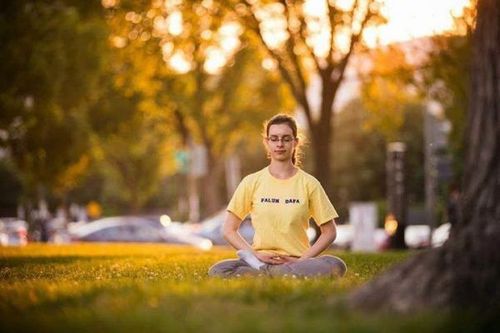This is an automatically translated article.
Depression affects about 20% of adults 65 years of age and older, and frequent depression can lead to a higher risk of heart disease and death from disease. Antidepressants and psychotherapy are common treatments for depression, but research has suggested that regular meditation practice may help by changing the way the brain responds to stress and anxiety. .
1. How does your brain react?
Stress and anxiety are major causes of depression and meditation can change your response to those feelings. Meditation helps the brain achieve sustained focus and return to focus when negative thoughts, emotions, and physical sensations intrude, which happens a lot when you're feeling stressed and anxious.
Meditation has been found to change certain brain regions that are specifically linked to depression. For example, scientists have shown that the medial prefrontal cortex becomes hyperactive in depressed people.
Another brain region implicated in depression is the amygdala or the "fear center". This is the part of the brain responsible for the fight-or-flight response, triggering the adrenal glands to release the stress hormone cortisol in response to fear and perception of danger.
These two brain regions work together to cause depression. The center is working to respond to stress and anxiety, and the fear center's response leads to a spike in cortisol levels to fight the danger that's only in your mind. When you meditate, you can ignore the negative feelings of stress and anxiety, which partly explains why stress levels decrease when you meditate.
2. Instructions on how to meditate to reduce stress
The silence and stillness you experience in meditation as well as the increased happiness and stress relief you experience outside of meditation are so appealing and welcoming that you naturally teach yourself how to walk deeper into that stillness and stillness each time you meditate.
2.1. Your first meditation
To start meditating, find a place where you can sit comfortably and quietly. Then, close your eyes and do nothing for a minute or so. Thoughts can come during that time, and that's okay. Then start pronouncing your spell in a whisper. Each time you hear your mantra, say it softly inside without moving your tongue or lips. After a minute, the sound will turn silent. Then continue to say your mantra quietly inside for another four minutes. If thoughts arise during that time, gently return to saying your mantra quietly inside. The sound will let you know when the four minutes are over.
2.2. Daily meditation practice
Meditate every morning and every evening for 15-30 minutes. It is best to meditate before eating. Try to meditate in a quiet place, but if you don't have a quiet place to meditate, that's okay. Noise is not a barrier to meditation.
Sit quietly, close your eyes and do nothing for a minute or so. Thoughts will come and that's okay. It is natural to have thoughts during meditation. After a minute or so, in the same natural way that thoughts come, and without moving your tongue or lips, quietly within yourself begin to say your mantra. Slowly repeat your mantra until you have finished meditating. When the thought comes, gently return to saying your mantra. When you're done meditating, lie down and rest for 4-5 minutes.
Sometimes you can say your spell isn't clear, and that's okay. Sometimes you may not say your spell, and instead your spell may be a feeling or a feeling about your spell, and that's okay. Sometimes all your thoughts and mantras can disappear and you may simply be aware, and that's okay.
You can go to sleep while meditating, and that's okay. When you wake up from sleep, meditate for a few more minutes, then lie down and rest for 4-5 minutes.

Ngồi thiền vào mỗi buổi sáng và mỗi buổi tối trong 15-30 phút
3. Can meditation music reduce stress?
Music can have a profound effect on both the emotions and the body. Faster music can make you feel more alert and focused. Upbeat music can make you feel more optimistic and in love with life. A slower tempo can calm your mind and relax your muscles, helping you feel light while releasing the stress of the day. Music is effective for relaxation and stress management.
Current findings indicate that music around 60 beats per minute can cause the brain to synchronize with the beat that induces alpha brain waves (frequency 8-14 hertz or cycles per second). This alpha brain wave is what is present when we are relaxed and conscious. To induce sleep (delta brain waves of 5 hertz), a person may need to spend at least 45 minutes, in a comfortable position, listening to soothing music. Listening to music for meditation seems to be able to change brain function to the same extent as taking drugs. They note that music is something that can be accessed by almost anyone, making it an easy stress reliever.
So what kind of music reduces stress the best? Somewhat surprisingly, Native American, Celtic, and Indian stringed instruments, drums and flutes are very effective at relaxing the mind even when played at moderately loud levels. The sounds of rain, thunder, and nature sounds can also be relaxing, especially when combined with other types of music, such as light jazz, classical (the "largo" movement) and easy music. . Since with music we rarely get to know the beat every minute, how do you choose the relaxing music that works best for you? The answer lies in part with you: First you have to like the music being played, and then it has to help you relax. You can start simply by discovering the music on this site. Some may help you relax, some may not. Forcing yourself to listen to relaxing music that gets you excited can create stress, not relieve it. If that happens, try to find alternatives on the internet or consult the staff. It's important to remember that being quiet doesn't mean you'll automatically feel sleepy. It means your brain and body are relaxed, and with new calm you can function at your best in many activities.
Please dial HOTLINE for more information or register for an appointment HERE. Download MyVinmec app to make appointments faster and to manage your bookings easily.













